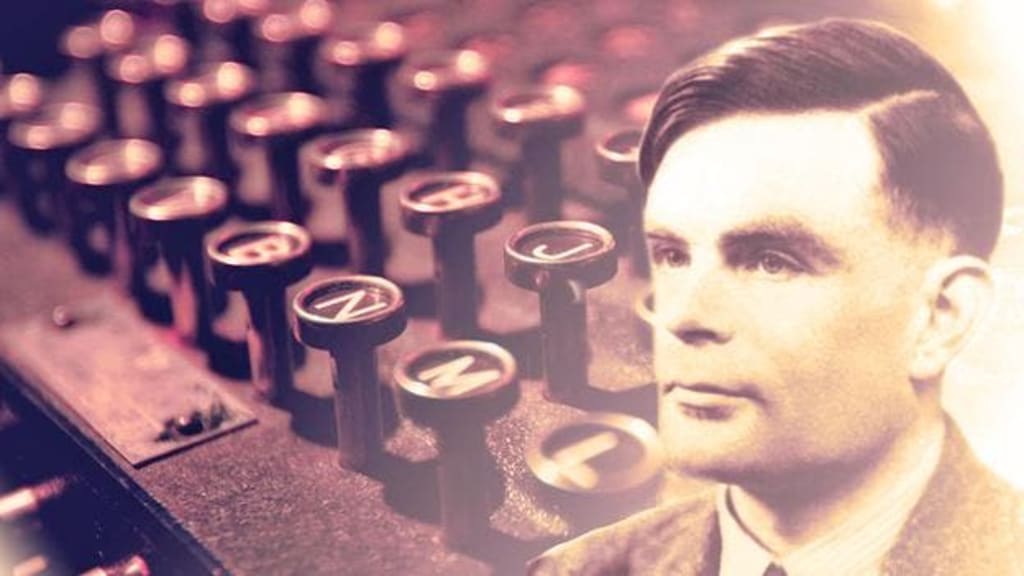Alan Turing: The Genius who Saved Millions and was Betrayed
The Genius, The Enigma, The Tragic End: The Legacy of Alan Turing

During the Second World War, Bletchley Park, an old stately home in southern England, became the home of the Allies' top-secret team of elite code breakers. Their mission was to unscramble the encoded communications sent by the Nazis all over the world using the infamous Enigma machine. Among these brilliant minds, one man stood out, destined to become one of the greatest thinkers of all time—Alan Matheson Turing. This is the extraordinary tale of a man who played a pivotal role in ending the war early, but tragically, his brilliance was overshadowed by a cruel twist of fate.
Alan Turing was born in London in June 1912, a child prodigy whose remarkable intellect was evident from a young age. He attended Sherborne, one of Britain's most prestigious schools, and later pursued mathematics at King's College, Cambridge. There, he graduated with first-class honors and published a groundbreaking paper that laid the foundation for computer science—a field that didn't even exist at the time.
In 1939, with the outbreak of World War II, Turing was drawn to his passion for code-breaking and joined Bletchley Park. The seemingly unbreakable Enigma machine was the primary target. This ingenious encryption device had 159 quintillion possible settings, posing an overwhelming challenge to the codebreakers. But Turing's brilliance and innovative thinking, coupled with the efforts of his team, led to the creation of the Bombe machine, which significantly expedited the decoding process.
Breaking Enigma was a monumental achievement that provided the Allies with invaluable intelligence, helping to thwart enemy plans and save countless lives. It is estimated that Turing's efforts shortened the war by at least two years and saved 14 million lives. Some historians even argue that without Turing's work, the Allies might not have won the war.
Despite his extraordinary contributions to the war effort, Turing's achievements were kept secret, and he didn't receive the recognition he deserved. After the war, he continued to make important advancements in computing, artificial intelligence, and mathematics. But in 1952, tragedy struck when he was arrested for being homosexual, which was illegal at the time.
Turing faced a cruel choice: imprisonment or chemical castration. He chose the latter, and for the next year, he endured painful estrogen injections that had devastating effects on his physical and mental well-being. His security clearance was revoked, preventing him from working for British intelligence ever again. Two years after his conviction, at the age of 41, Turing was found dead from cyanide poisoning in an apparent suicide.
While suicide has been the widely accepted explanation, there are alternative theories. Some speculate that Turing's death might have been an accidental result of his electroplating experiments, while others raise questions about the possibility of foul play due to the secrets he held.
Regardless of the circumstances surrounding his death, one thing remains certain—Alan Turing was an exceptional genius whose contributions changed the course of history. In 2009, he received an official apology from the British government, and in 2013, he was posthumously pardoned by the Queen. In 2017, the Alan Turing Law pardoned thousands of men, including Turing himself, who were convicted of gross indecency for being gay.
Alan Turing's legacy lives on as a symbol of the brilliant minds that shaped our world. His story is a poignant reminder of both humanity's potential for greatness and the importance of compassion and understanding towards individuals, regardless of their differences. The tragic ending of Alan Turing's life serves as a stark reminder of the injustices that many have faced, making it imperative that we continue to strive for a more inclusive and accepting world.
About the Creator
KWAO LEARNER WINFRED
History is my passion. Ever since I was a child, I've been fascinated by the stories of the past. I eagerly soaked up tales of ancient civilizations, heroic adventures.






Comments (1)
I remember the movie about him and how unfair it was he was treated! Great article!